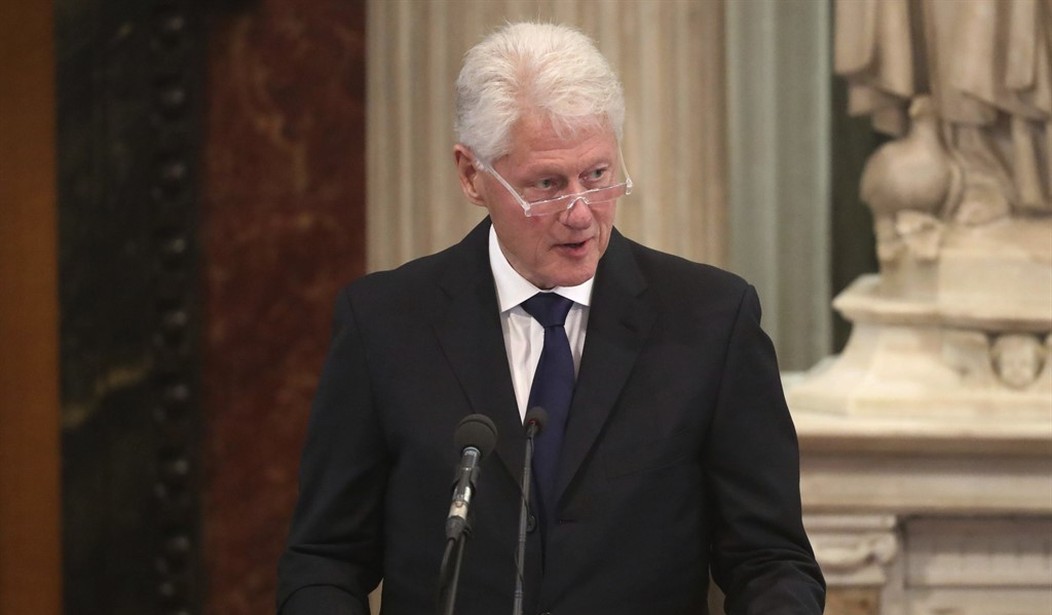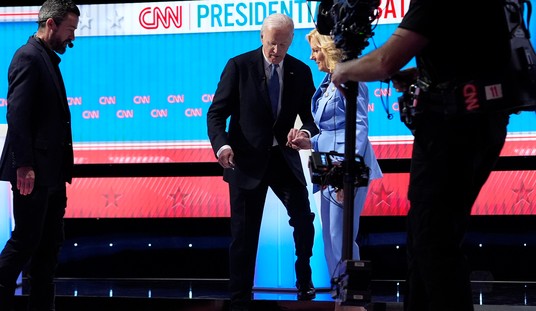To paraphrase Barack Obama: At what point have former presidents made enough money? Ruth Marcus raised that question last week after watching Obama take the equivalent of a year’s presidential salary to speak to a Wall Street crowd, while being provided a generous taxpayer-paid pension in retirement. Jason Chaffetz, who will go into retirement soon himself, says the spectacle of $60 million publishing paydays and fortunes on the speaking circuit have once again raised the need to reduce taxpayer support for former presidents who clearly no longer need it:
Last year, then-president Barack Obama vetoed a bill that would have curbed the pensions of former presidents if they took outside income of $400,000 or more.
So now that former president Barack Obama has decided to accept $400,000 for an upcoming Wall Street speech, the sponsors of that bill say they’ll reintroduce that bill in hopes that President Trump will sign it.
“The Obama hypocrisy on this issue is revealing,” said Rep. Jason Chaffetz, R-Utah, chairman of the House Oversight and Government Reform Committee and sponsor of the 2016 bill. “His veto was very self-serving.”
Chaffetz and Sen. Joni Ernst, R-Iowa, the sponsor of the companion Senate bill, say they will re-introduce the Presidential Allowance Modernization Act this month. The bill would cap presidential pensions at $200,000, with another $200,000 for expenses. But those payments would be reduced dollar-for-dollar once their outside income exceeds $400,000.
Let’s recall the reason presidents get pensions in the first place. Until the death of Franklin Delano Roosevelt, American presidents had considerable personal wealth, which usually allowed them to commit to full-time political work instead of earning a living. Harry Truman came from much humbler roots, and unlike some other national politicians before and since, didn’t spend his career becoming mysteriously wealthy. Truman, notably, refused to cash in on the office after he left it, turning down endorsements, consultancies, and lobbying firms. His only regular income was an Army pension of $112 a month, plus the sale of memoir rights to Life Magazine.
Congress had good reason to fear that they would face the prospect of a former president living in near-poverty — if not Truman, then at some point in the future. The Former Presidents Act, passed in 1958, provided for a pension and lifetime Secret Service protection for retired presidents, as long as they were not removed from office by Congress. That did not apply retroactively, so Truman never benefited from it, but it has applied to every president from Dwight Eisenhower on forward.
We’ve come a long way since Truman. Former presidents of both parties now routinely cash in on the office after leaving it, and people shrug at it as simple free-market activity. Presidential memoirs used to be the big payday, but now the speaking circuit holds just as much promise for quick cash from vested interests. Obama isn’t the first to discover this, nor the most egregious example. Bill Clinton wins that title, having spent $16 million in taxpayer money on his expenses and pension in as many years — while racking up perhaps more than $200 million in income over the same period. Clinton was so notorious that the New York Times editorial board was castigating him a decade ago and demanding changes in the “lavish pension” former presidents receive:
Today former presidents receive a lavish pension — $186,000, increased yearly — payable as soon as they depart the White House, regardless of their age. In addition, former chief executives are granted hundreds of thousands of dollars in annual staff, office and travel allowances. For fiscal year 2007, Clinton will receive approximately $1.16 million from the U.S. Treasury — his telephone stipend alone will come to $77,000. All former presidents are also entitled to free, round-the-clock Secret Service protection for themselves and their families. The cost of providing security for previous “first families” is estimated at $20 million a year.
According to the National Taxpayers Union, Clinton will reap a lifetime pension payout of more than $7 million, assuming a normal lifespan. The senior George Bush can expect to bank more than $3 million; for Carter, the total will likely top $4 million.
Few begrudge the Secret Service protection. Congress briefly capped it at 10 years in 1997 but repealed the limit shortly afterward, perhaps with Saddam Hussein’s nutty assassination plot of retired president George H. W. Bush in mind. Bush has outlived Hussein by a decade or so already, but the incident reminded everyone that former presidents remain high-profile targets.
However, this editorial demonstrates how insane the spending has become, especially regarding Bill Clinton. He has actually soaked up more than double the 2007 projection of lifetime costs just ten years later. There’s no indication that Obama plans spending on that scale, but we’re still in the early days of his retirement.
The only thing that’s changed since is the pension itself, indexed upward to $200,000. Chaffetz and Ernst tried to reform the system last year in a bill that passed with bipartisan support, but Obama vetoed it, claiming it would harm former federal workers. Those would be the workers who began serving former presidents, of course:
“It would impose onerous and unreasonable burdens on the offices of former presidents, including by requiring the General Services Administration to immediately terminate salaries and benefits of office employees and to remove furnishings and equipment from offices,” Obama wrote in his veto message.
He added that he would be open to reconsidering a revamped version of the bill if it addressed his concerns.
The best way to address this would be to stop paying office expenses right up front. Former presidents have plenty of income potential to pay for their own operations. A pension is not unreasonable, but neither is a means test to spare taxpayers the cost if it’s unnecessary.
Would it be fair to apply this retroactively to the current retirees? We have five at the moment — Jimmy Carter, the two Bushes, Clinton, and Obama — who would have to recalculate their financial commitments if those changes were made, but all except Carter have the means to do so. The pension isn’t a contract, and Congress should be able to allocate taxpayer funds as it sees fit otherwise. Politically, though, it probably will be easier to follow the tradition in presidential pension legislation and apply it only to future presidents. However, a limit on expenses applied immediately is not unreasonable, and in fact is long overdue — by about ten years.
Update: Forgot the link to USA Today, and added it in the edit. Also, cleaned up some ambiguous and incomplete thoughts in the middle two paragraphs.







Join the conversation as a VIP Member